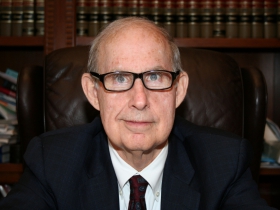Voter Fraud Issue Gets Its Day in Court
The federal court gave the state a chance to show voter fraud was rampant. So what did they prove?
For at least a decade, people have been debating whether there is voter fraud in Wisconsin that needs to be prevented with a measure like photo ID. Lots of hot air on both sides has been expended. But a courtroom provides an opportunity to provide hard evidence in making the case for or against voter fraud.
On Tuesday federal judge Lynn Adelman indicated he was unconvinced by the proof of fraud, and issued a decision declaring the state photo ID law is unconstitutional. Assembly Speaker Robin Vos (R-Rochester) immediately ripped Adelman’s decision as political: “he starts with a heavy liberal bias and not that of a judge.”
Is Vos right? The state had a very skilled lawyer, Wisconsin Attorney General J.B. Van Hollen, making the case for the photo ID law. You’d think he would jump at the chance to bury the court in evidence of all the voter fraud that can be prevented by this new law. In fact, if you read his huge final brief, written after all the trial testimony was taken, Van Hollen offered very weak arguments on that point.
“The defendants could not point to a single instance of known voter impersonation occurring in Wisconsin at any time in the recent past,” Adelman’s decision states. “If it is occurring in Wisconsin to any significant extent, then at trial the defendants should have been able to produce evidence that it is.”
Testifying at the trial was Rutgers University Professor Lorraine Minnite, who specializes in researching the incidence of voter fraud. She studied elections in Wisconsin during the years 2004, 2008, 2010 and 2012 to find any incidents of voter fraud. “She consulted a variety of sources of information, including newspaper databases, news releases by the Wisconsin Attorney General, criminal complaints, decisions by state courts, and documents issued by the GAB. From these sources, Minnite was able to identify only one case of voter-impersonation fraud,” Adelman writes, and that did not involve in-person voter impersonation, which the photo ID requirement is meant to prevent.
M.V. Hood III, a University of Georgia political science professor, who testified for the defendants, nonetheless provided more evidence casting doubt on the likelihood of much fraud through voter impersonation. “Hood’s method for detecting this… involves comparing a database of deceased registered voters to a database of persons who had cast ballots in a recent election,” Adelman writes. “Hood and his coauthor applied this methodology to the 2006 elections in Georgia and found no evidence of ballots being illegally cast in the name of deceased voters.”
“I suppose that’s possible,” Adelman wrote, “but most likely these cases also have innocent explanations and the District Attorney’s office was simply unable to confirm that they did… Moreover, the most Landgraf’s testimony shows is that cases of potential voter-impersonation fraud occur so infrequently that no rational person familiar with the relevant facts could be concerned about them. There are over 660,000 eligible voters in Milwaukee County, and if the District Attorney’s office finds two unexplained cases each major election, that means that there is less than one questionable vote cast… per 330,000 eligible voters. The rate of potential voter-impersonation fraud is thus exceedingly tiny.”
Nor is it easy to commit such fraud, Adelman noted: “A person would need to know the name of another person who is registered at a particular polling place, know the address of that person, know that the person has not yet voted, and also know that no one at the polls will realize that the impersonator is not the individual being impersonated. The defendants offered no evidence at trial to support the notion that it is easy to obtain this knowledge.”
The Journal Sentinel quoted Adelman’s most over-the-top conclusion: “As the plaintiffs’ unrebutted evidence shows, a person would have to be insane to commit voter-impersonation fraud.” But Adelman went on to note: “The potential costs of perpetrating the fraud, which include a $10,000 fine and three years of imprisonment, are extremely high in comparison to the potential benefits, which would be nothing more than one additional vote for a preferred candidate…a vote which is unlikely to change the election’s outcome.”
Van Hollen, however, also asserted that the photo ID law could prevent other forms of voter fraud. As Adelman notes, “the defendants do not adequately explain how that could be so.” Van Hollen indeed spent little time on this issue, while Adelman carefully explained why photo ID was unlikely to stop other kinds of fraud.
Van Hollen seemed far more concerned with other issues he clearly felt were stronger for his side, notably his argument that the photo ID requirement will not have a disproportionate impact on minorities.
There is abundant evidence, however, that minorities are less likely to have a drivers license. A frequently cited 2005 study by the UW-Milwaukee Employment & Training Institute found that in Milwaukee County, 73 percent of white adults, 47 percent of Black adults, and 43 percent of Hispanic adults possessed valid driver’s licenses, while in the balance of the state, 85 percent of white adults, 53 percent of Black adults, and 52 percent of Hispanic adults had valid driver’s licenses.
Van Hollen, however argues that since the state (in 2012) began offering free ID cards, the number of minorities without an ID has likely declined. But he could offer no statistics on this. Prosecution witness, University of Washington Prof. Matt Barreto, offered a survey showing 317,000 registered voters statewide lacked an ID, while Hood, the defense witness, estimated the total could be as low as 167,000.
That’s a lot of voters. “To put this number in context, in 2010 the race for governor in Wisconsin was decided by 124,638 votes, and the race for United States Senator was decided by 105,041 votes,” Adelman wrote.
And minorities and low-income people are far more likely to lack an ID, testimony showed. Prosecution witness, statistician Leland Beatty, concluded that African American voters in Wisconsin were 1.7 times as likely to lack a matching driver’s license or state ID and Latino voters were 2.6 times as likely compared to white voters. Hood actually found an even higher disparity between minorities and whites.
There was abundant testimony from minority voters as to the difficulties of getting the state ID. They must take off from work and take the bus to various agencies to get the needed forms. Often the identification forms don’t match perfectly as to middle initial, which can disqualify them.Typically they must have a birth certificate, but Barreto’s survey showed that more than 25,000 people in Milwaukee County lacked both a qualifying ID and a birth certificate. The cost of the birth certificate is $20, which can be a barrier for poor people.
Conservative state Supreme Court Justice Patience Roggensack has already indicated her concern about this cost, in oral arguments on a challenge to the voter ID law that this court is hearing. “I’m troubled by having to pay the state to vote,” she said.
The problem of getting the birth certificate is all the more complicated if you have to get it from another state. And minorities are more likely to face this challenge. UW-Madison Prof. Barry Burden presented statistics showing 75 percent of white residents were born in Wisconsin, yet only 59 percent of Blacks and 43 percent of Latino residents were born in this state.
Van Hollen, however, repeatedly hammered the point that, whatever the disparities between whites and minorities, the plaintiffs “have not demonstrated that eligible African American and Latino voters are unable to obtain qualifying ID.”
Actually, in a handful of cases involving faulty birth certificates, it appears some people may never be able to vote under this law. But the testimony certainly suggested it can be very difficult to get an ID, which could discourage many from voting. And as Adelman concluded, the federal Voting Rights Act prohibits any law under which members of a class of people “have less opportunity than other members of the electorate to participate in the political process and to elect representatives of their choice.”
Adelman quotes U.S. Supreme Court Justice Antonin Scalia, providing an illustration of the meaning of the Voting Rights Act: “If, for example, a county permitted voter registration for only three hours one day a week, and that made it more difficult for blacks to register than whites,” the law “would therefore be violated.”
Van Hollen, however, offered a blizzard of quotations from case law to dispute what Adelman ultimately concluded. It’s entirely possible the judge’s ruling will be overturned by the higher courts.
But either way, the courtroom testimony showed there is barely a scintilla of evidence that voter impersonation fraud has ever occurred in Wisconsin. It also made clear that the solution to this nonexistent problem, the Voter ID law, will make it far harder for minorities to vote.
Murphy's Law
-
Top Health Care Exec Paid $25.7 Million
 Dec 16th, 2025 by Bruce Murphy
Dec 16th, 2025 by Bruce Murphy
-
Milwaukee Mayor’s Power in Decline?
 Dec 10th, 2025 by Bruce Murphy
Dec 10th, 2025 by Bruce Murphy
-
Total Cost of Foxconn Is Rising
 Dec 8th, 2025 by Bruce Murphy
Dec 8th, 2025 by Bruce Murphy























I wonder if Judge Adelman referenced the recent comments by Judge Richard Posner of the 7th Circuit Court of Appeals. Judge Posner voted to uphold Indiana’s voter ID law, which was subsequently upheld by the Supreme Court. Posner said he voted to uphold it as a measure to prevent voter fraud, but that he has since concluded that the incidence of voter fraud is infinitesimal, and the main purpose of the law was to diminish turnout among certain groups.
Also, one reason the Indiana law was upheld as not being an “unreasonable burden” was that driver’s licensing offices were open at least one day each week in every county in the state. That is not true in Wisconsin.
Voter fraud is a myth. There is far more error in the voting tabulation process. Any funding should go towards improving the actual methods and efficiency of voting that includes poll worker training, voting machinery, expanded hours of operation, and a consistent tabulation process for counting the votes. Voter ID is a purely political obstacle calculated to win elections for Republicans.
It is a great idea in our modern world to have identification, but not all have the means to obtain it or it comes at great expense.
My mother was born in a farm house and birth certificates rare. Many older style county records have been lost to fires, floods, age, and lack of funds to keep records in more rural areas of the country. Finding older records can be an expensive process. Many young urban people lack financial resources to take a bus to a motor vehicle department and the bus does not go to these places either. When you get there you find out you do not have a record you need and have to start over and chase somewhere else, sometimes out of state to Mississippi to find the record if possible.
This is the best article I’ve read on the issue.
Adelman’s finding is a great confirmation Urban Milwaukee’s reporting on this issue.
I will never understand the correlation between minorities and their inability to get IDs. As far as I have ever seen, minorities get carded for cigarettes, alcohol, or check cashing just as much as anybody else. You have to really question someone’s legality if they are living day to day without even a birth certificate. Even $20 is not a barrier for a lifetime of legal identification? How do you even get a legal job without a birth certificate? I think that a voter should at least have something to at least identify themselves as being 18 and a legal citizen in an age where identity theft is rampant.
There is no such thing as voter theft and fraud is a myth. There is more error in the actual process of vote counting than any perceived fraud. Any improvement should be directed at the tabulation process, poll worker training, and expanded voting hours. Republicans should stop their continued attacks on rights, fairness and justice for all. These laws come from corporate attorneys written for ALEC. They are meant to divide and conquer the dim-witted in the voting public and suck up legislative time and energy so real solutions that benefit the majority of voters can never be achieved. In turn large business keeps working people fighting among themselves over what should never be brought up in a legislative process.
Voter ID is a solution in search of a problem.
All ALEC laws that Walker and Republicans have passed are a detriment to the majority of working citizens and erode freedom and rights that were hard won over the last century.
David, you failed to answer Dan’s question. How does one move about and move up in society without any kind of identification? Why is it that you are so against people getting proper identification cards? It can only help them in life, there is not one downside. Also there have been a small number of voter fraud cases as I am sure you are aware. To say there is no such thing is to be either willfully ignorant or lying. Doesn’t every vote count?
Chris – that is a question that loads of data, research, and books have been written. 53206 has some of the lowest family median incomes in the state and nation. They have little means, money, political clout or voice. Many people do exist on a purely cash and barter basis without a bank account, email, and off the grid. They still vote. 53206 also has greater purchasing power per square city block that Mequon according to a recent UWM study.
For many people the ID is easily obtainable, but for many others that is not the case. My wife tried to obtain the official version, but was turned down. She needs a notarized copy of the marriage certificate. Another trip and more money and time wasted. My mother was born in a rural out of state farm house in 1926. No birth certificate is available. My mother-in-law was ready to turn in her drivers license but kept it at the last decision point even though she does not drive. Getting her the official ID version is problematic – elderly can be cranky, sickly, weak, and do not want to bother chasing around but have voted without problem for most of their life. Many records are lost to fire, mold, floods, and are out of state and some are just lost. Duplicate records can be expensive and timely to obtain.
A voter ID potentially excludes hundreds of thousands of people and puts them through a costly process to obtain records. It is a waste of time and money based on a fabricated system of mythology about voter fraud. The fascist and nazis are infamous for the “show me your papers” statement. That still holds true today in the Republican ALEC 21st Century version of fascism. On voting day, every citizen is equal to the Kochs, and Republicans cannot tolerate this freedom and right granted by the Constitution.
Dan Hanke, it’s not so much that minorities have a harder time getting an ID (except perhaps that they are more likely to born out of state which can make getting an acceptable birth certificate much harder), but the fact that non-whites were much less likely to already have an acceptable ID (driver’s license, non-driver Wisconsin ID, or passport).
If you required all voters to get a new ID, it would be much fairer to minorities (and much harder on many whites).
Until around 1990, many Americans lacked ANY “acceptable” photo ID. It was only around 1990 when all states put photos on drivers’ licenses. I lived in Wisconsin until 1972 and my driver license (which I got without showing ANY ID) had no photo. When I moved to Minnesota in 1972, I marveled at how their driver’s licenses had photos (largely because 3M–a Minnesota Company–was selling the technology). I moved to NY in 1974 which had no photos on licenses and didn’t until the late 1980s with a phase-in that probably went beyond 1990.
You could indeed “live a lifetime without acceptable ID” because, until a few years ago, ID wasn’t required for most things. You could be hired without ID until about 1987 (and a Social Security card sufficed at first). You could fly without an ID until sometime in the 1990s. You could change banks (or open your first ever bank account) without ID until 2002. You could often buy beer or tobacco without ID until a few years ago when people started checking more (and older people STILL aren’t carded). Showing IDs at doctors’ is VERY recent. And if you kept your same employer (or were self-employed), didn’t switch banks, didn’t fly, and didn’t drive, you could indeed “live a life without acceptable ID”.
I had an aunt who did just that. She died two years ago at age 80 with no “acceptable” ID. She lived her entire life (except for college) in Milwaukee, never drove, had two college degrees, worked for over 30 years, owned her home, had Packer season tickets (for the games in Milwaukee), left an estate of nearly one million dollars, had debit and credit cards, but died without an “acceptable” ID. She got a Wisconsin non-driver ID once (before they required a birth certificate) so she could vacation via airplane. In her later years, she slowed down, stopped flying, and saw no reason to renew her state ID (which she only used for plane trips–which she stopped taking). While she wasn’t a minority, she illustrates how it was indeed possible to live a full life without an “acceptable” ID.
Cloward-Piven Strategy to make America collapse:
1.Organize previously unorganized groups eligible for government benefits but not currently receiving all they can.
2.Identify new beneficiaries and/or create new benefits.
3.Impose new stresses on the welfare systems, with the ultimate goal of forcing its collapse.
4. Register as many Democrat voters as possible, legal or otherwise and help them vote, multiple times if possible.
5. Overwhelm the system with fraudulent registrations using multiple entries of the same name, names of deceased, random names from the phone book, even contrived names.
6. Make the system difficult to police by lobbying for minimal identification standards.
Richard Andrew Cloward (1926 – 2001) was an American sociologist and an activist. He was primary motivator for the passage of the National Voter Registration Act of 1993 known as “Motor Voter”. He taught at Columbia University for 47 years.
Frances Fox Piven is still an American professor of political science and sociology at The Graduate Center, City University of New York